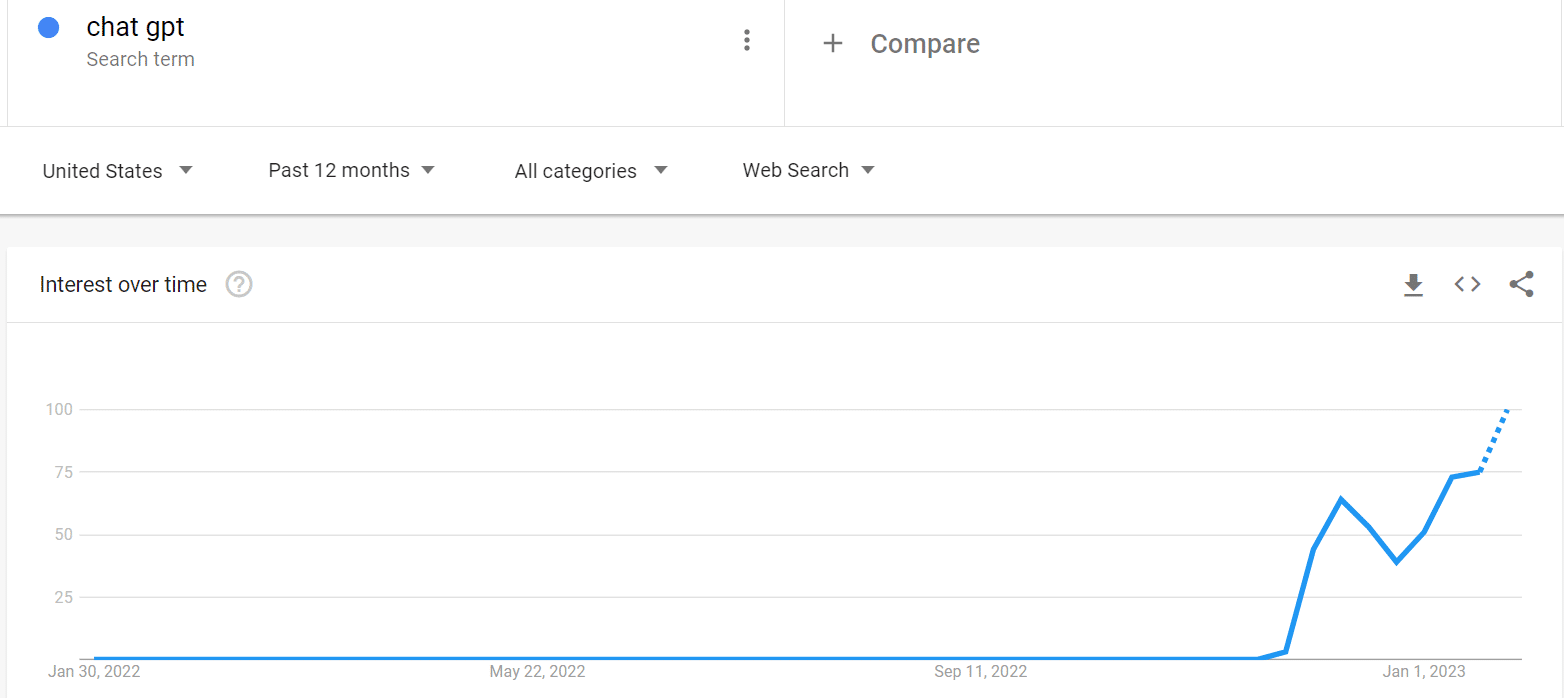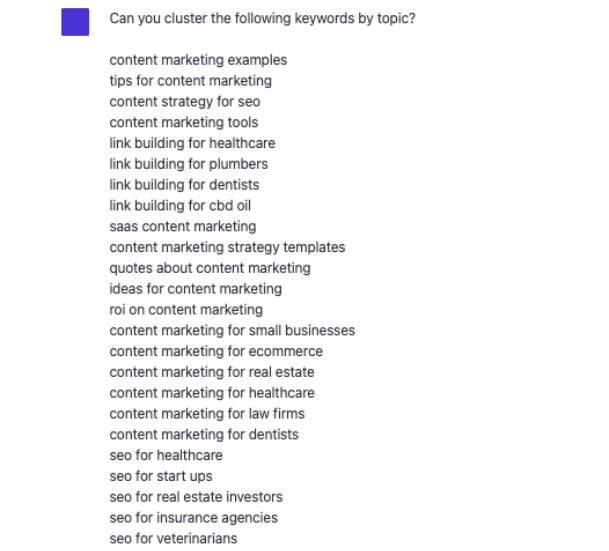Microsoft’s plan to leverage its investment in ChatGPT’s parent company, OpenAI, is moving fast, with ChatGPT already surfacing in the Microsoft Bing interface.
Mere months after Alphabet CEO Sundar Pichai referred to chatbots as a “code red,” Google soft-launched Bard, its answer to ChatGPT.
And user interest is keeping up. Interest in ChatGPT has exploded since it was released to the public at the end of November:

For SEOs contemplating a future that combines chatbot results with Google (and Bing’s) fundamental focus on “helpful content,” the path forward is a complicated one.
In this article, I’ll take on the topic of keyword research in the ChatGPT era:
- What’s changed for the better.
- Potential threats that could emerge.
- What might happen next.
- The skills and philosophies SEOs need to maintain to get results.
Let’s jump in.
AI in search: How does it help?
First, remember that AI-driven chatbot technology has been around for a while. What changed with the release of ChatGPT is that it was suddenly broadly accessible.
That said, many SEOs are already familiar with using ChatGPT (either by reading one of the thousands or articles or trying the free tool themselves) for keyword research.
Here’s an example of some block-and-tackle work it can help you perform.
Query

Initial output

Drill-down

In two short queries, we took a good-sized list of keywords, sorted it by topic, and assigned user intent – all in seconds.
This is a great surface-level start that saves SEOs a ton of time over more manual methods. It’s a great example of ChatGPT’s function as a tool.
In general, ChatGPT speeds up the way you can do research. You can ask it to create relevant topics quickly, it can help you classify the intent of different keyword lists, and it can look at semantics and cluster them.
Think of it like you would think of Excel. In Excel, macros let you spend more time in analysis rather than writing the formulas manually. ChatGPT can serve a similar function, doing the grunt work and leaving more time for the human layer of nuance.
What threats could it pose?
I'm sticking to the topic of keyword research here. (It would take many thousands of words to dig into the topics of AI-generated content vs. human-generated content, the business threats of chatbots keeping users on the SERP and away from brand sites, and AI-driven SERPs vs. current SERPs.)
The main threat posed by ChatGPT functionality to effective keyword research is similar to the threat posed by other powerful tools: it tempts marketers to take too many shortcuts.
It can be enticing to type in a keyword and ask ChatGPT to find all the related keywords for you and stop there. But that work won't be very good and it's something a lower-priced competitor could offer.
The next step after that should be a gap analysis. What's not there?
Finding a negative is hard work. It takes reading and deep thought around the concept to realize what's missing. Uncovering the need nobody else is addressing is how you strike keyword gold.
The threat of using ChatGPT for keyword research is falling in love with its ease.
The real value of good SEOs still comes in doing the hard work of nuance and recognizing negative space. (Once AI can do that, we'll have new threats to discuss.)
What's not changing at all?
ChatGPT hasn't changed the questions I hear about keyword quantity and word count.
I still get asked "It should be at least 300 words, right?" and "How many times should we include the main keyword in this?" with regularity.
ChatGPT also hasn't changed how I answer these questions.
It's about delivering value, not counting words or keywords.
Good SEOs use keywords to evaluate intent and understand what the user wants to learn.
They strive to understand the psychology of a searcher. Sometimes they need short content ("How do you double-knot your shoelaces?" but sometimes they need a book ("What is the meaning of life?").
Especially as systems get more intelligent at delivering what people need, the human differentiator of assessing the psychological nuance of keywords will become more important.
I have a process called "keyword drafting." Here, I think of the concept first and then write the draft only thinking about the value and quality of the answer to the question.
Only after that do I start to ask what keywords could be applied, then re-draft the content.
This works well when you have information from your sales or product teams on customer questions and needs. You've gotten your topic without researching keywords, so write your content without them before figuring out where they seamlessly fit in.
What might come next?
My educated guess for the near future of ChatGPT is that it'll be integrated into keyword planning tools, content and topic analysis features. AI-driven chatbots will become more entwined in the SEO planning landscape, not a separate workflow.
The details of Google and Microsoft's AI-driven chatbot rollouts will be closely scrutinized. Marketers will keep a close eye on user behavior and traffic trends to get a pulse on the short-term effects on the SEO industry.
What's certain is that understanding and utilizing AI for keyword research now can help clue SEOs into the models and how they're trained.
The more understanding you can build now, the better you'll be positioned to use AI to your advantage as it becomes more integrated.
Search marketers can gain an edge
As with most tech innovations, ChatGPT will force marketers to understand and develop skills around the layer(s) of expertise that will supercharge the power of the tech output.
Once ChatGPT has had its say during keyword research, the nuance and psychology of intent must inform what you do with those keywords – including finding the gaps the tech can't yet reach.
The post How to navigate SEO keyword research in the era of ChatGPT appeared first on Search Engine Land.
via Search Engine Land https://ift.tt/tQVoziB

No comments:
Post a Comment